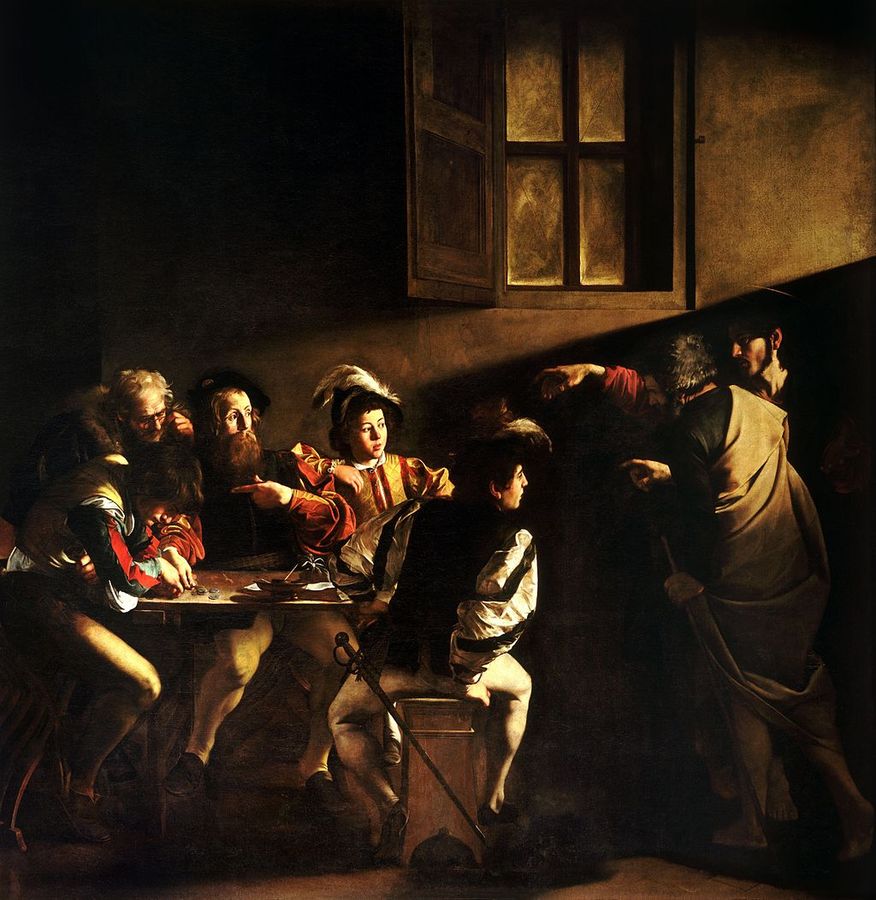This is a guest post by Jane Arney.

The Calling of Saint Matthew, 1598–1600
Caravaggio (Michelangelo Merisi)
Have you ever been called by God? That may seem like an outrageous question to most of us. Who, me? Called by God? How could that be? How would we even know if we were called? Most of us probably don’t hear a voice from heaven as Jesus did at his baptism, or as Samuel did in his sleep; if we did we might think something was seriously amiss and seek immediate help!
However, our calling can happen in far more mundane ways. We see an example of this unexpected occurrence in The Calling of Saint Matthew by Caravaggio, the bad boy of Baroque art. Though prodigiously talented, Caravaggio (1571-1610) was a brawler and a murderer who died alone while on the run from the law. He was nearly forgotten until the twentieth century, when his genius and influence on the artists of his day was recognized. His use of extreme realism and chiaroscuro, or the contrast between light and dark, give his paintings an immediacy and drama that are instantly recognizable.
Jesus went out along the sea.
All the crowd came to him and he taught them.
As he passed by, he saw Levi, son of Alphaeus,
sitting at the customs post.
Jesus said to him, “Follow me.”
And he got up and followed Jesus.
While he was at table in his house,
many tax collectors and sinners sat with Jesus and his disciples;
for there were many who followed him.
Some scribes who were Pharisees saw that Jesus was eating with sinners
and tax collectors and said to his disciples,
“Why does he eat with tax collectors and sinners?”
Jesus heard this and said to them,
“Those who are well do not need a physician, but the sick do.
I did not come to call the righteous but sinners.”
(Mark 2:13-17)
In Caravaggio’s work, we see a dingy room with light streaming in from a high window outside the picture frame, illuminating the figures at the table. Jesus stands at the far right with Peter, both of them barefoot. The outstretched hand of Jesus and the diagonal edge of the ray of light both point to the bearded man in the black hat, Levi/Matthew, who points at himself as if to say, “Who, me?” The darkness and grime of the room signal to us the nefarious activity taking place there. Tax collectors were hated because they extorted even more than the myriad of Roman taxes from the people, and as the passage indicates, because of this they were classed with sinners.
The passage in Mark continues with the Pharisees complaining that Jesus eats with these sinners and tax collectors. Many people were drawn to Jesus, including the unlovable and the unclean, the outcasts and the despised, the criminals and the poor. Rather than adhering to orthodox rules of purity, Jesus broke bread with them, spoke with them, and touched them, which shocked the Pharisees. Jesus’ reply, that he comes for the sick and the sinner, is spoken to all of us, “For all have sinned and fallen short of the glory of God” (Romans 3:23). We are all called to be transformed. Where are you called? If a barefoot man in a bar suddenly points at you and says to follow him, how would you respond? It is so easy for us to miss the summons to God’s will for our lives.
To share a personal story, over a year ago the thought crossed my mind that I should get involved in jail ministry, a thought that I quickly squelched. I’ve never been jailed, what would I have to offer to those women, where would I find the time? That was really the last thing I wanted to do. Wasn’t I reacting just like the Pharisees in the story? Shortly afterwards, I attended a Reconciliation service. After I’d confessed to the priest my fears and self-centered sins, he suggested that I visit those who were incarcerated. I nearly fell from my chair in surprise! The very thing that I’d told myself was what I could not do, that was what God was calling me to do! I was like Matthew, pointing at myself saying, “Who me?”
I reluctantly obeyed the call and it has become a source of transforming joy in my life, teaching me mercy and compassion, which are not necessarily my most common responses! It would have been so easy for me to ignore this call; the priest was visiting the parish for reconciliation so no one would have known. I’m glad I recognized and responded to God’s call.
Where is your call? Jesus is saying to you, “Follow me.”
Jane Arney is an art lover, joy seeker, child of God and Panda-cam addict. She earned her Master’s degree in Art History at the University of Texas at Austin and is currently a Doctoral Candidate in Art History at Emory University in Atlanta. Inspired by Henri Nouwen’s profound spiritual exploration of the Rembrandt painting, The Return of the Prodigal Son, she applies Ignatian spirituality by combining scriptural texts with great works of art. Visit her blog, Infinite Windows.
| If you’d like to write for God In All Things please see the Submissions page. |









I love my daughters sooooooooooooo much.
Sent from my iPad
>